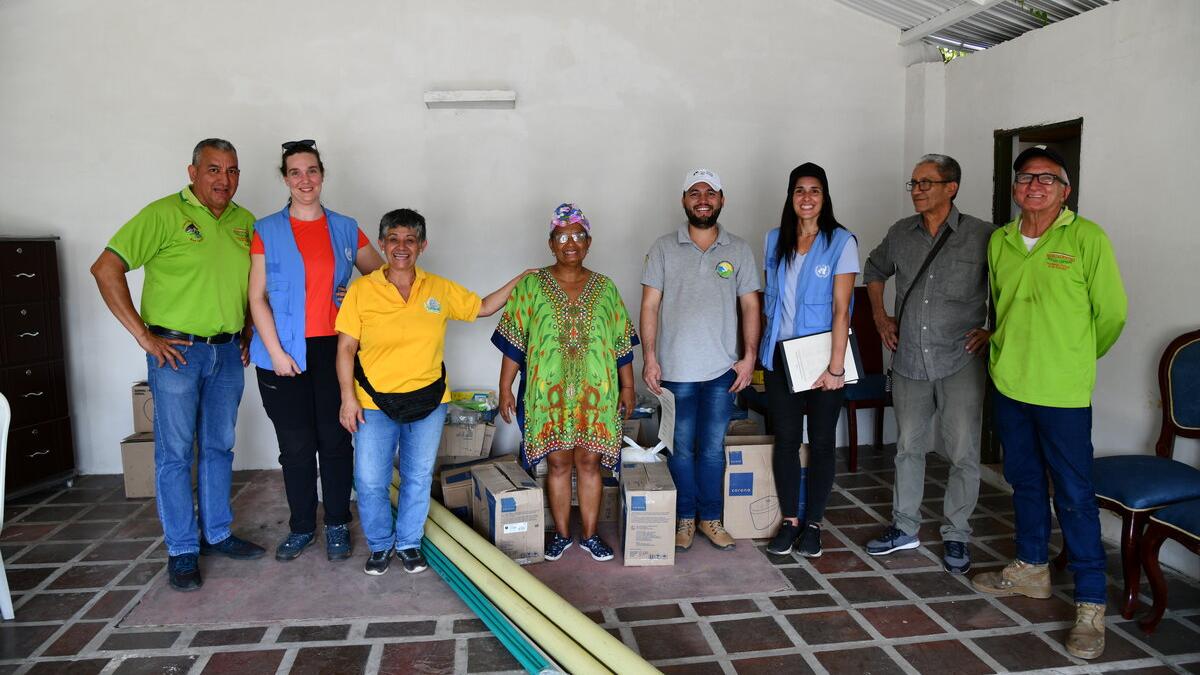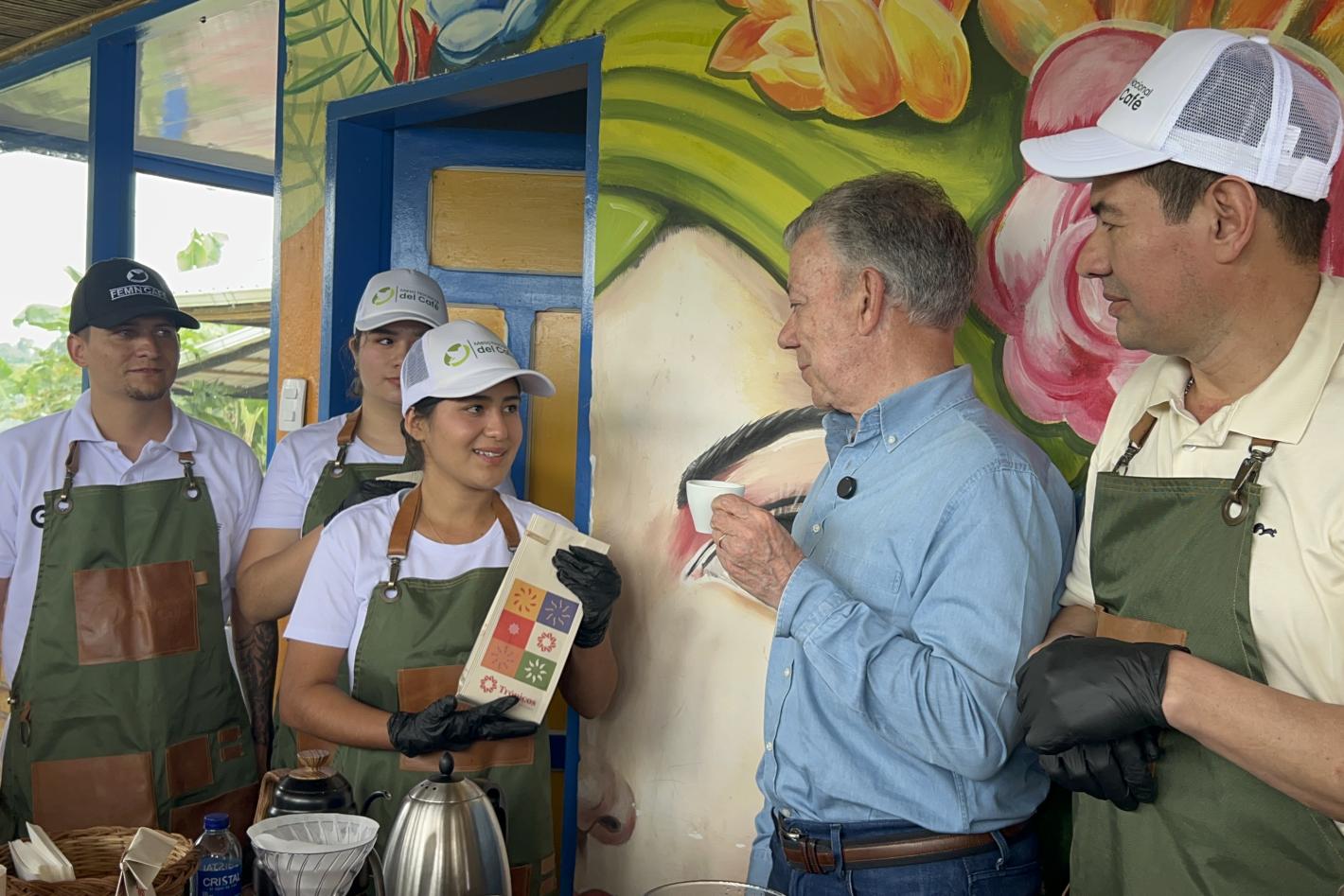Four years ago, Cooperativa Multiactiva de los Comunes (Coomulnes) was founded in vereda Venus of the municipality of Tuluá, department of Valle del Cauca, in southwestern Colombia. Nowadays, this cooperative has 36 former combatants and 34 victims of the conflict who found a new livelihood for themselves and their families by producing and selling coffee.

Sadly, security issues forced them to leave behind their vereda, their crops, and a warehouse where they were assembling a coffee dryer. This was a hard blow, and some members abandoned the project. However, those who stayed were determined to not give up on their dream. They relocated to the urban area of the municipality and sought support from the mayor's office. They received assistance to install their equipment in Mercacentro farmers’ market under a loan for use.
The market has been open for 22 years. Every Tuesday and Friday, farmers come to this widely recognized market to sell their produce to the urban residents of Tuluá and even to clients from neighbouring municipalities.

Things were somewhat confusing when Coomulnes first arrived. The farmers who had been there for years knew nothing about the newcomers who set up a stall in their market. Once they learned that Coomulnes was founded by former combatants, fear took hold of some of them, especially those who were former members and pensioners of the public security forces.
Eleonora Serna, secretary of the board of directors of Mercacentro, remembers when they received the news: “A while ago, Coomulnes arrived at the market. At first, we didn't know who they were; later, when they told us, our first thoughts were: ‘what’s going to happen?’ ‘Former guerrillas?’” Following the initial uncertainty, the board of directors took the initiative. Here, Eleonora highlights the role of women in resolving the conflict: "Seventy per cent of the members of Mercacentro’s board of directors are women. As leaders and women, we are part of this machine and strive for peaceful coexistence between us farmers, and other communities and people. That’s why we’ve decided to approach them".
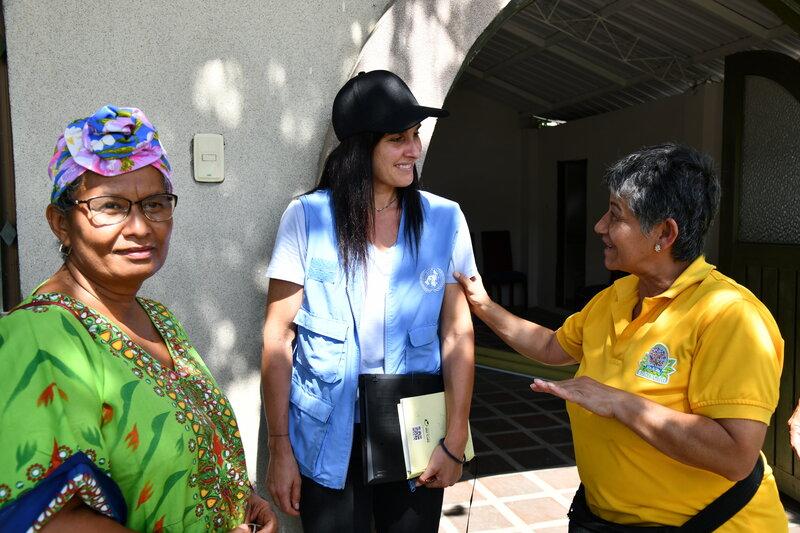
Humberto Giraldo, a member of Coomulnes and former combatant of FARC-EP, recounts these early stages: “When we arrived at Mercacentro, the mayor assigned a part of this construction to us, and we saw them there. We didn’t even know that some of the people selling wine and fish were former police officers. We knew that some of the farmers were victims of the conflict. At first, they were very cautious with us. Then, one day, the board of directors invited us to a meeting, and I accepted the invitation. It was our first encounter with them, and I told them that we didn’t want to interfere with their work but wanted to work with them, together. They even cheered!”.
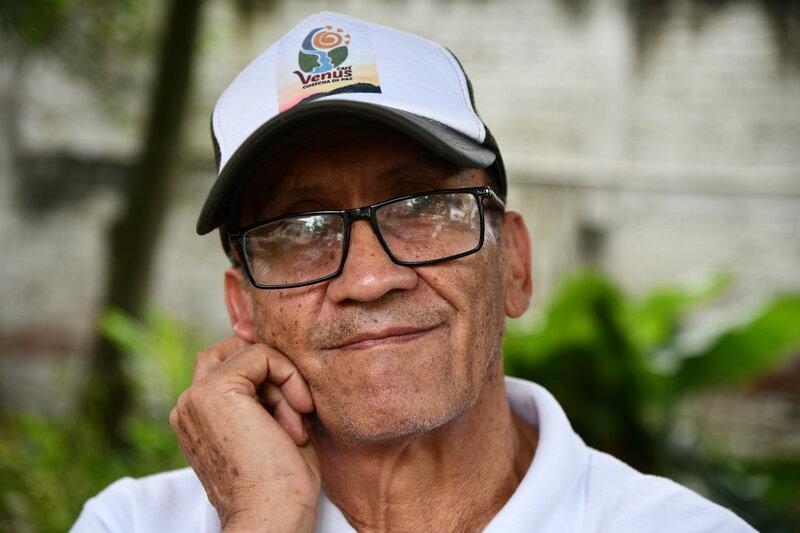
Jaime Alberto Sánchez, a former police officer, has a stall in Mercacentro. “Some things scared me at first. When Coomulnes first arrived, I was scared and apprehensive about them. However, from the moment I met them, dialogue dispersed the fear and I realized they were just like us," he said.
“Some things scared me at first. When Coomulnes first arrived, I was scared and apprehensive about them. However, from the moment I met them, dialogue dispersed the fear and I realized they were just like us (...)".
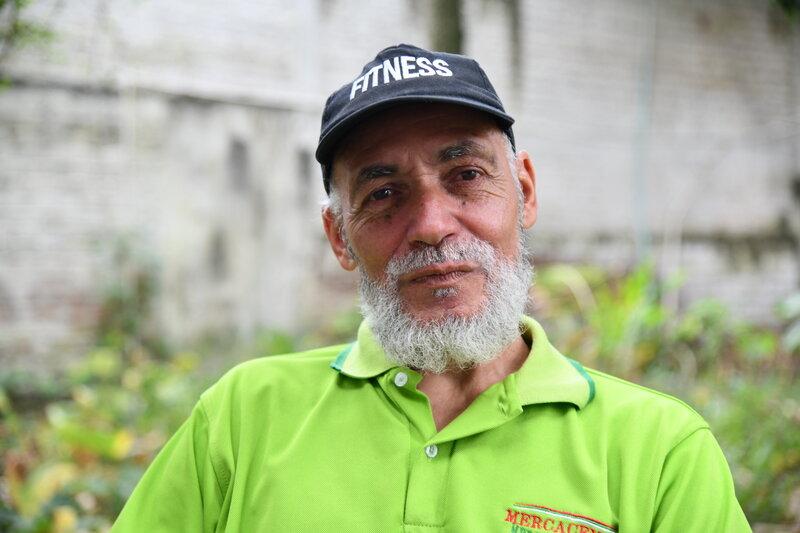
Small actions, a big impact
The United Nations Verification Mission in Colombia helped secure funds to buy materials to undertake a seemingly simple task: pave a section of the market where several farmers had set up their stalls and which, during rainy days, were left in the mud and, in the summer, the wind and dust bothered producers and customers alike. This is how they started working together for the common good. Mercacentro’s farmers organized shifts and worked to pave that section. While working, they shared their experiences and got to know each other better.
Mercacentro took on a new face. Both locals and visitors immediately noticed the changes. Comfort for producers and customers; safety, as the stalls were now away from the parking area; and a friendlier and more walkable space for everyone. Following initial suspicion and fear, this was the first stone in their collaboration.
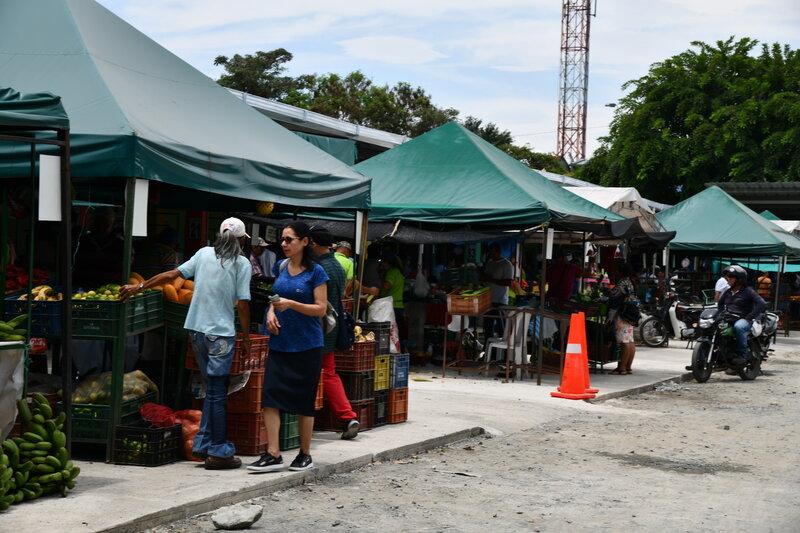
Eleonora describes the positive changes brought about by this initiative: “This had a very positive impact on the farmers’ market. We had lunch, joked around, worked, and sweated, together. Now all my colleagues are happy. Very good things lie ahead for the market. It’s all about the attitude with which you reach out to people," she said.
Humberto is convinced that donating the aid they initially requested for them to the locals was the right move. “The funds provided by United Nations have helped us build good relationships with them because they saw that I was telling the truth, that we didn’t want to undermine them but work with them. Today, they see us with different eyes; they see that we can support them too,” he said.

Jaime confirms that they now have a fresh perspective: “We are all determined to further develop our own processes and life projects. I produce my coffee and they produce their coffee. We apparently compete with each other, but I do not see them as competitors; we all contribute to the coffee industry. Everyone makes their part; I don’t think there is a cold rivalry anymore.”
“We are all determined to further develop our own processes and life projects (...) We apparently compete with each other, but I do not see them as competitors; we all contribute to the coffee industry. Everyone makes their part; I don’t think there is a cold rivalry anymore".
Indeed, this collaboration was fruitful and further strengthened the bonds of trust between the farmers. They realized that they can achieve great things together, so they continued collaborating to receive support from the Mission and other entities such as the United Nations Development Programme (UNDP) and Paso Colombia. They received resources to adapt a house where they will hold remembrance meetings, sanitary facilities to provide better hygienic conditions for farmers and customers and painted an outdoor mural that gives a new face to the market and celebrates the dignity of farmers. In just a few months, they have made significant progress and are very optimistic about the future.
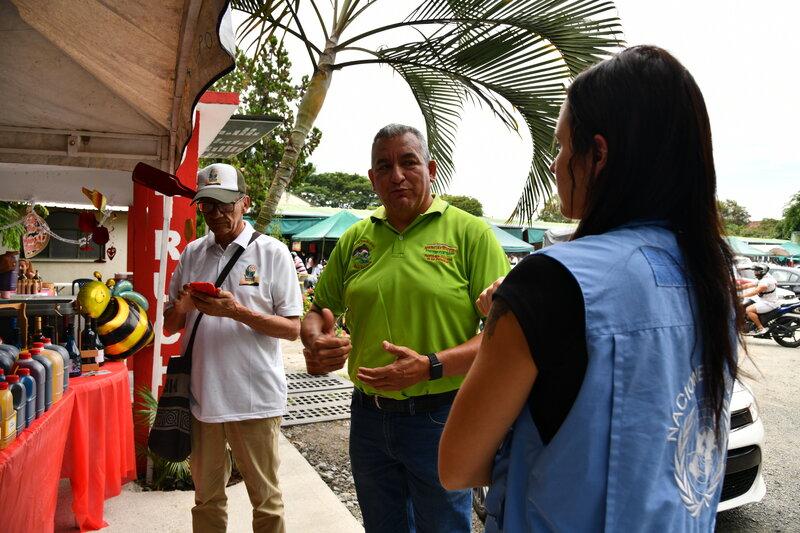
During the celebration of the most recent anniversary of the market, the farmers organized a meeting to celebrate its history and recognize the new members’ contributions to Mercacentro. They took the opportunity to commemorate the signing of the Peace Agreement and demonstrated that their experience is living proof that everything is possible through dialogue and that where there is a will, there is a way.
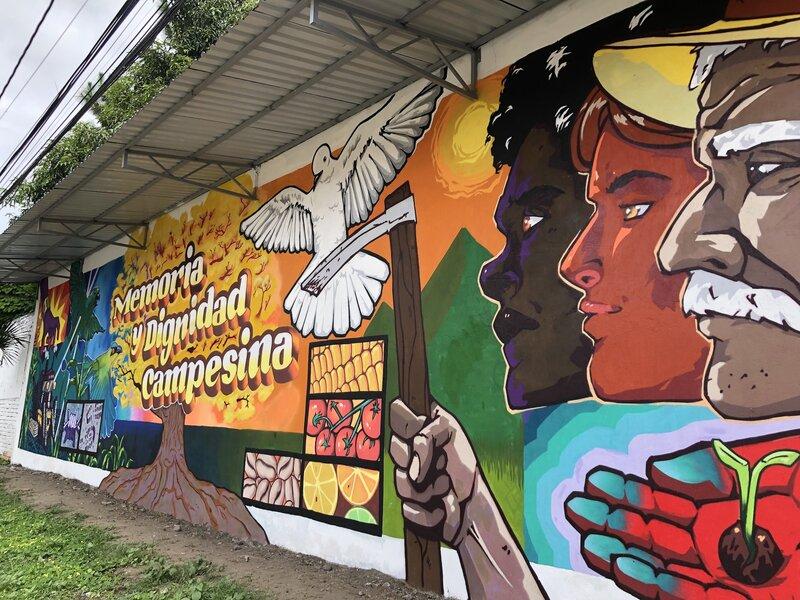
“Mutual respect is the cornerstone for everything. We must give them a chance. It's not easy for them; they feel stigmatized, threatened, and ostracized. As farmers and as human beings, we must have a good heart and we must forgive. It’s not easy to forget, but we can forgive them and move on, because we cannot stay stagnant. I know that the future holds many good things for the farmers’ market and for them. And here we are, living peacefully together. It’s possible. We must let our hearts heal and move on,” said Eleonora, beaming with satisfaction for their achievements.
Years ago, some members of Mercacentro were clashing parties amid conflict; others would be caught in the middle of this dispute, suffering the consequences of a war they did not ask for. Former combatants, former members of the public security forces and farmers who suffered the conflict now share a trade. Today, they are united in a farmers’ market, among fish, fruits, vegetables, handicrafts, and coffee. They share the love for the land, the desire to strive and the dream that, just like them, all Colombians will enjoy the fruits of peace.

Jhonatan Sierra, chairman of Coomulnes board of directors, shared his expectations for the future of Mercacentro: “We dream of this space as a home for all Tuluá. People will come here, eat to feed their bodies, and dance to feed their souls with art and culture. We all breathe the same air and come from the same land,” he concluded.
By: Nadya González
Strategic Communications Officer - Regional Cali
UN Verification Mission in Colombia


